The Top 7 Best Irrigation Pumps of 2023 - Sprinklers, Wells and More
by Carl Anderson
Updated on Jul 15, 2023
Imagine you have a front lawn that can't get any water. You live in one of those areas where water conservation is heavily enforced, and so maybe you need to catch water in a rain barrel.
So how do you use water from a rain barrel in a lawn sprinkler? It's simple. You use an irrigation pump.
With an irrigation pump, you can get that nice, green lawn making you the envy of the neighborhood. All you need is an irrigation system with the best irrigation pump driving it.
In 2023, we investigated all the irrigation pumps on the market to determine which is the best to pump water for your lawn or garden.
Our Best Irrigation Pumps for Sprinklers
List of Services
-
Best Overall - Red LionList Item 1
- 40 PSI at 30 GPH
- Cast Iron
- Self-priming
-
Best For Lawn Sprinklers - Acquaer Portable PumpList Item 3
- Portable
- Max 1210 GPH
- Ideal for sprinkler systems
-
Best Shallow Well Pump - Aquastrong
- 1.6HP Motor
- Automatic operation
- Quiet
-
Best Durable - Wayne 1HP Portable Stainless Pump
- Perfect for Garden and Lawn
- Portable Pump
- Continuous cooling
-
Best Budget - Fluentpower Shallow Pump
- Max of 65 PSI
- Affordable and effective
- Can work as booster
-
Best Booster - XtremepowerUS 1.6 HPList Item 2
- Built in thermo-overload protector
- Designed for residential homes, farms, cabins
- Max lift of 150 feet
-
Best High Capacity - Flotech
- Self-priming
- Corrosion resistant
- Can power 30 sprinkler heads
Red Lion Sprinkler Pump - The best lawn sprinkler pump overall for running water to your front lawn. It's heavy, and spares no expense but we believe its the best one for the job. Check it out here.
Table of Contents
- The Top 7 Best Irrigation Pumps for Sprinklers - Full Analysis (Updated for 2023)
- Best Overall
- Best Lawn Sprinkler Pump
- Best Shallow Well Pump
- Best For Durability
- Best Budget
- Best Booster
- Best High Capacity
- Sweet New Earth's Top Pick
- How To Buy The Right Lawn Irrigation Pump
- Type
- Benefits
- Drawbacks
- Sweet New Earth Final Say
- FAQs
Things to Consider Before Buying
Material
How durable a sprinkler pump will be depends on the material used to construct it. The three most common types are stainless steel, fiberglass, and cast iron. If you see a pump made out of plastic, you should run away.
Capacity
The capacity of the sprinkler pump comes down to horsepower. An internal motor drives sprinkler pumps. It allows them to draw in water or push it to where it needs to go. The more powerful the motor, the better the pump to pump water. More motor power also means the water can be pushed further without sacrificing consistency.
Power Supply
The power supply shouldn't be a huge factor in what pump you purchase. However, if you are pumping from a lake or pond near your house, you need to understand there may not be a power supply nearby to power your pump. This seems like common sense, but some people forget. This is not a big problem as you can use an extension cord but exercise caution as you will be using water.
Distance
We briefly touched on this one above, but distance is an important factor in what irrigation pump you purchase. If you buy a low PSI pump and need to go hundreds of yards to water the lawn, you've made a mistake. Before you buy a pump, you are going to want to measure the distance between the water source and the sprinkler heads.
The Top 7 Best Irrigation Pumps for Sprinklers Reviewed - Full Analysis (Updated for 2023)
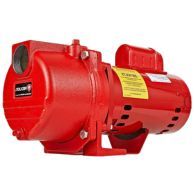
The Red Lion Sprinkler pump is definitely the biggest and baddest sprinkler pump out for this purpose. It can run 40 PSI at 30 Gallons Per Minute (GPM), and 10 PSI at 70 GPM.
Most of its cost is coming from its durability. It has a cast iron exterior so you know it's tough. The glass-thermoplastic inside is great for moving well and lake water.
We actually like that's bright red because we are safety aficionados. Anything bright red is good for safety... it's also good for not losing the pump.
It's called a self-priming pump but you actually need to prime it one time. Not a huge deal. After you fill it the first time, the pump is good to go.
PROS
- Cast iron
- 71 Gallons per Minute
- Dual voltage capability
CONS
- Some users reported quality issues
- Recommend setup with an electrician
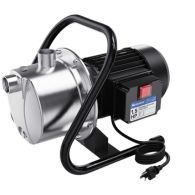
This pump sports a nice and convenient carrying handle so you can carry it around your lawn with ease. But we know you aren't buying a bump just so you can carry it around.
It's an electric pump that uses 115V so you should be able to plug it in without issue. The GPH output varies depending on how far you push the water.
At 5 feet, the pump can handle 1210 GPH but at 140 feet, it can only pump out 135GPH. The sweet spot for most people with be 880 GPH at 70 feet - still relatively fast with enough power.
The inlet connection has the ability to come from a shallow pool of water like shallow ponds or directly from tap. That means you can also hook it up to a rain barrel if you run that type of irrigation.
Some people have reported in that this pump is fine for gravity fed irrigation but that it would be better if it ran up to 60 PSI.
Some users reported quality issues with the pump. One noted that the pump stopped working after 30 minutes of use because the pump is overloading. Most people need to pump water longer than 30 minutes at a time.
PROS
- Portable
- Two inlet connections
- Ideal as a sprinkler pump
CONS
- The thermal overload protection built in apparently can fail
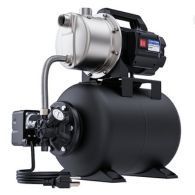
This pump is a bit more expensive but despite the cost it proved to be the best sprinkler pump that is a shallow water pump. Like most pumps it comes with thermal overload protection so it's able to detect when the pump is running dry.
We suspect most people who have issues with water pumps don't actually use the pumps right. But this pump comes with a large cooling fan and boasts of stronger heat dissipation.
Not only that but it has a 5 gallon water pressure tank that allows the pump to have water in reserve. This pre-installed pressure tank adds years on to the life of the pump.
The pressure gauge on the tank measures how much water pressure is available so it can turn on and off the pressure at 20 and 40 PSI, respectively.
Onto the pumps motor. It's a solid 1.6HP motor that can suck water into the pump at 26 feet maximum. It can push water out at 22 GPH with a max flow rate of 1320 GPH. This is fine for garden use or even domestic water supply.
PROS
- 304 Stainless steel casting
- Reserve 5 gallon tank
- Pressure switch regulator
CONS
- Heavy
- Stationary
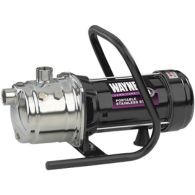
The Wayne 1HP Portable Stainless Pump is one of favorite pumps. It's portable, compact, simple to use and durable. The pump was actually designed to be a lawn sprinkler pump. It was meant for inground sprinkler systems.
It's an above ground pump that runs of 120V. It can move water from its source up to 20 feet. The stainless steel exterior makes it a corrosion resistant pump which is what you want when there is a lot of water around.
At 100 feet, the pump can still discharge water at 210 gallons per hour which is better than some of the other brands we've seen. At only 40 feet, it can push out water at 660 gallons per hour. Either way, it can maintain water pressure of up to 60 PSI which is good for most sprinkler heads.
Be sure you do the math on your sprinkler heads. 60 PSI should be enough for 3 - 4 sprinklers, but 660 GPH may not be enough water. The pump can handle the pressure but it might not supply enough volume for a huge lawn.
PROS
- Great for rain barrels
- 20 feet of lift
- Lightweight and portable
CONS
- No internal strainer for debris
- Requires foot valve
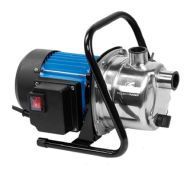
The Fluentpower Shallow Pump ranges from 1 to 1.5HP depending on what amount of power you want. The maximum flow rate has 900 GPH with a maximum lift head of 148 feet. At 40 PSI, you can maintain 350 GPH.
This pump comes with a nice warning. You need to prime the pump before use and discharge any excess water after use. This is the type of thing that will extend the pumps lifespan which is something you want to do.
Like most of the pumps here, this is another pump designed for lawn irrigation. The pump is able to suck water in from a maximum of 26 feet.
We see a lot if people using pumps like these in industrial settings. That's really not the point.
It's a water pump so you can water your lawn or emergency settings like pumping out a flooded basement. Constant, unending use will lead to malfunction.
PROS
- Cheap and effective
- Good for lawns
- Can work as a booster pump
CONS
- Some people experienced pump failure after short time of use
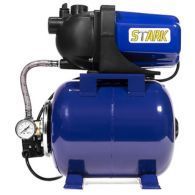
Booster pumps are typically meant for home use but you can sometimes use them for lawn sprinklers. Typically, lawn sprinkler pumps have a booster built in because if you ware pulling water from a shallow body of water, you will need to apply or regulate the pressure.
You can use this pump to boost the water pressure to a couple of sprinklers in your yard. It has an easier setup than most pumps and it is also pretty quiet which is nice. Nothing worse than a loud pump.
It's only 28 lbs so even though it doesn't look too portable, it can be moved somewhat easily. The maximum flow rate has 1671 gallons per minute at 115V.
Unfortunately, if there are any defections on this pump water can get into the metal parts and rust out the system.
PROS
- Good for lawn irrigation systems
- Easily controllable water pressure
CONS
- Not for potable water
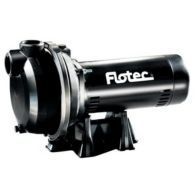
This high-capacity, dual-voltage pump can operate up to 30 sprinkler heads at a time. It's rugged and durable, made of glass, fiber and thermoplastic.
We like this pump because its self-priming design is good for use on automatic sprinkler systems which we are a fan of. It's self-priming and corrosion resistant so you shouldn't see wear issues like with the other options.
It's a centrifugal pump so its you can pull up water through a tube rather than submersible pumps which require you to put the pump under water. It pumps water at a respectable amount with the GPH of 67 and 47 PSI.
The pump needs to be winterized (like all pumps) or water will freeze in and damage the system. Luckily it has a dewatering valve so you can properly winterize the pump.
PROS
- Dual voltage capacity
- Can operate 30 sprinkler heads
- Heavy-duty fiber glass
CONS
- 47 PSI on the lower end
Sweet New Earth's Top Pick for Which Sprinkler Pump Is Best
Our favorite sprinkler pump is the last one: the Flotech High Capacity Sprinkler Pump. This pump is expensive so we couldn't put it as the best overall because some people aren't willing to pay $400 for the added capacity - and frankly, most people don't need it.
Nonetheless, this beast can power up to 30 sprinkler heads. It's not mobile, or portable - so you might need a plumber to hook it up to your water system but it is effective, and that's the most important thing.
How We Chose The Best Sprinkler Pumps
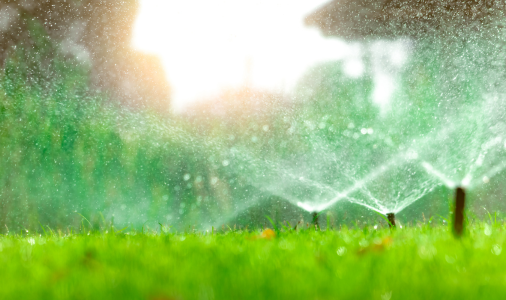
An irrigation pump, at its core, is a piece of equipment that shifts water from a water source to wherever it needs to be. In this case, that would be your lawn.
The goal of this article is to make sure you don't buy a bigger pump than you actually need. You want to spend the right amount of money on your pump so you can invest in other parts of your irrigation or to just save the extra cash.
Pumps are great because they push water from the source to the farthest away sprinkler head with consistent water pressure. Consistent water pressure is ideal for operating both the pump and the sprinklers at peak efficiency.
Not all pumps are great. You need a pump with the right size, the right capacity, and one that is the most energy efficient. You also need the pump to be ideal for your water source.
Better flow means a more consistent watering which means a more beautiful lawn. Ultimately, most people get a steady pressure from their hose but if you can't do that, then you want to keep reading below so you can get the pressure your sprinklers need.
Types of Irrigation Pumps
Irrigation pumps come in different shapes and sizes. Do you need to know all of them? That's to be determined. By anyways, here's the main types:
- Submersible Sprinkler Pumps
- Centrifugal Sprinkler Pumps
- Booster Sprinkler Pumps
Submersible Sprinkler Pumps
A submersible sprinkler pump is a sprinkler pump that goes underwater. They are most effective when they are used in a deep source of water. You would not use these in shallow pools of water. They work best with large sources of water like lakes, streams, ponds or even wells.
These sprinkler pumps are usually housed in a protective casing to make sure no water gets into the actual pump. It also keeps out debris. They push water out rather than sucking water in and since they operate underwater, these sprinkler pumps do not need priming.
Centrifugal Sprinkler Pumps
The centrifugal sprinkler pump is the most common irrigation pump. They are great for shallow sources of water because they draw water up into the pump via a hose. For the pumps to work properly, the hose must be submerged otherwise you risk running the pump "dry." The centrifugal sprinkler pump is not meant to pull in air, but centrifugal pumps are excellent for pulling water.
Booster Sprinkler Pump
Booster sprinkler pumps are a little bit different. They sit in the middle of the water source and the sprinkler head. Their goal is to raise the water pressure from the water source so that it's high enough for the sprinkler on the other end to work properly. For example, say the water source is only 25 PSI but your sprinklers need 50 PSI. The booster pump would theoretically raise the PSI to match the needs of the sprinkler.
Benefits
At the end of the day, the biggest benefit of using an irrigation pump for you is being able to water your lawn. If you run your water pump from a lake or pond, you can help save water because you aren't using it directly from the tap - however, you are still using water.
That means they will save you money on the water bill. Ultimately, sprinkler pumps are only one part of good irrigation systems but a good irrigation system as a whole is great for conserving water. You only use what you need, and you can reduce overall water use by up to 60%[1].
Drawbacks (Installation and Maintenance)
When it comes to installing and maintaining irrigation pumps, most people simply do not have the training - especially if they are hooking it up in the home directly to the water supply. Most people want a simple lawn sprinkler pump they can turn on and off as needed to supply water to the lawn sprinklers.
Nonetheless, you need to refer to your instruction manuals for whatever pump you decide. If you run the pump dry, if you leave water in the pump all the time, if you don't let it air out - you are going to destroy your pump quick. Water corrodes. And these are water pumps.
That being said, if you notice any issues with a pump out of the box, contact the supplier right away. It does seem like there are some warranty issues with certain pumps.
At the end of the day, some of these water pumps are not industrial-grade. That means they are not built to last, and a lot of people complain that the pumps fail after only limited use. Best way to prevent this is to make sure you always prime the pump and drain it after use, but unless you buy an industrial grade pump or have professional installation of a pump, you will run into some issues here and there.
Sweet New Earth Final Say on Irrigation Pumps
Picking out the best lawn sprinkler irrigation pump can be difficult. We hope this guide helps you on your way to an easier watering method. Focus on the key things to consider, and you shouldn't have too many problems. Hopefully, you'll be able to water your lawn much easier now.
FAQs
Before you go...
Now that you know all about the best irrigation pumps for your lawn sprinklers for your lawn, you have only won half the battle. Now, you can look into some of the best lawn sprinklers. Be sure to read our next guide so you can have a complete watering system for your lawn...
Related Articles:

Carl Anderson is the main author of Sweet New Earth. He is an avid outdoors enthusiast who loves gardening. He spends his time reading, hiking and learning about new ways to optimize his garden. You can learn more about him here.
